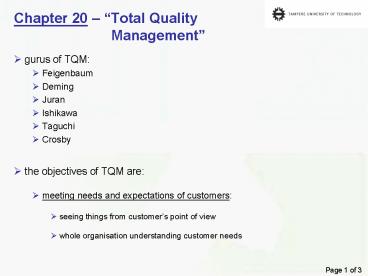Chapter 20 Total Quality Management - PowerPoint PPT Presentation
1 / 14
Title:
Chapter 20 Total Quality Management
Description:
appraisal costs (controlling quality) internal failure costs (scrap, rework) ... knowledge management: knowledge is the essential ingredient which makes a product ... – PowerPoint PPT presentation
Number of Views:227
Avg rating:3.0/5.0
Title: Chapter 20 Total Quality Management
1
Chapter 20 Total Quality Management
- gurus of TQM
- Feigenbaum
- Deming
- Juran
- Ishikawa
- Taguchi
- Crosby
- the objectives of TQM are
- meeting needs and expectations of customers
- seeing things from customers point of view
- whole organisation understanding customer needs
Page 1 of 3
2
20 Total Quality Management
- covers all parts of the organisation
- concept of internal customer and supplier
- every person in the organisation contributes to
quality - beyond not making mistakes bring something
positive to the job - all costs of quality are considered
- prevention costs (design, training, SPC)
- appraisal costs (controlling quality)
- internal failure costs (scrap, rework)
- external failure costs (loss of customers)
Page 2 of 3
3
20 Total Quality Management
- designing in quality rather than inspecting it
- reduced costs
- proactive rather than reactive
- developing systems and procedures
- documentation (procedures, work instructions,
specifications) - developing continuous process of improvement
Page 3 of 3
4
Part Five The Operations Challenge
- Chapter 21 The Operations Challenge
5
Chapter 21 The Operations Challenge
- the strategic challenges of an operation
include - globalisation
- configuration strategies
- home country configuration
- regional configuration
- global coordinated configuration
- combined regional and global coordinated
Page 1 of 7
6
21 The Operations Challenge
- social responsibility
- application of ethics in decision making
- there are several groups to whom ethical duty is
due - customers
- staff
- suppliers
- community
- shareholders
Page 2 of 7
7
21 The Operations Challenge
- environmental responsibility
- environmental burden
- created by the totality of operations activities
- EB P x A x T
- to reduce EB
- P unfeasible to decrease
- A not favourable to decrease
- only T (creation of goods and services) can be
optimised - product and service design affects utilisation
of materials in the short-term and long-term
recyclability
P population size A affluence (consumption
measure) T technology
Page 3 of 7
8
21 The Operations Challenge
- technology
- technology is a source of competitive advantage
- increases automation
- improve decision making performance
- offer something different form the competitors
- sophisticated manipulation of customer-related
data - technology plays a role in decision areas
- product design
- layout of facilities
- planning and controlling
Page 4 of 7
9
21 The Operations Challenge
- knowledge management
- knowledge is the essential ingredient which
makes a product - embedded in the products design, creation and
delivery - information is data which has been analysed in
terms of its context - knowledge is information which is interpreted
through a process of using judgement and values
Page 5 of 7
10
21 The Operations Challenge
- explicit knowledge
- is codified
- explained verbally, in writing
- found in formal documents, specifications
- implicit knowledge
- is built up over time as a result of experience
- is difficult to explain in words
- its result is skill and intuition
Page 6 of 7
11
21 The Operations Challenge
- knowledge creation inside the company can be
explained using the concepts of explicit and
tacit knowledge - individuals acquire knowledge by moving between
tacit and explicit knowledge in cycles
Page 7 of 7
12
Exam
- 75 of grade
- need to pass to pass the course
- details
- location Festia Iso Sali
- date May 9 (or May 16)
- time 9am till 12 noon
- 3 hours
- 3 sections
13
Exam
- section A
- 3, short answer questions (approx. 3 5
sentences) - choose from 5 alternatives
- testing ability to know terminology
- points 5 each
- eg. What is vertical integration and what are
the 3 factors used to define it? - section B
- 1, medium answer question (approx. 0.5 1 page)
- choose from 2 alternatives
- testing ability to understand course material
- points 20
- eg. List and define the steps involved in
"quality planning and control".
14
Exam
- section C
- 1, long essay question (approx. 1 3 pages)
- choose from 2 alternatives
- testing ability to link parts of the course and
use own ideas - points 40
- eg. Explain the steps you would take to improve
the operations for its dependability, if you
would concentrate on "planning and control" in
your operations (eg. capacity, supply chain, lean
operations, etc.).































